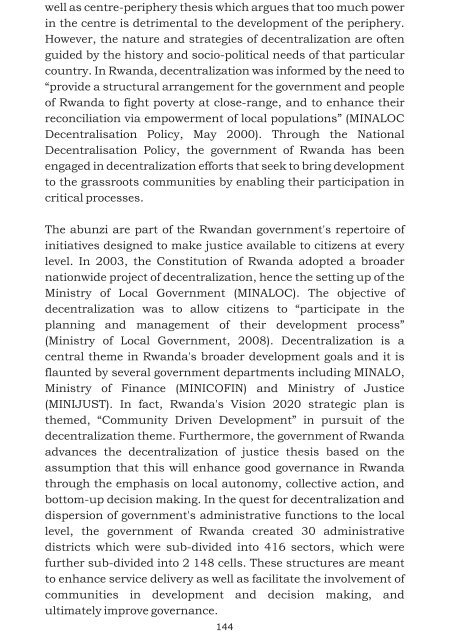Beneficiaries are actors too.pdf - Southern Institute of Peace ...
Beneficiaries are actors too.pdf - Southern Institute of Peace ...
Beneficiaries are actors too.pdf - Southern Institute of Peace ...
Create successful ePaper yourself
Turn your PDF publications into a flip-book with our unique Google optimized e-Paper software.
well as centre-periphery thesis which argues that <strong>too</strong> much power<br />
in the centre is detrimental to the development <strong>of</strong> the periphery.<br />
However, the nature and strategies <strong>of</strong> decentralization <strong>are</strong> <strong>of</strong>ten<br />
guided by the history and socio-political needs <strong>of</strong> that particular<br />
country. In Rwanda, decentralization was informed by the need to<br />
“provide a structural arrangement for the government and people<br />
<strong>of</strong> Rwanda to fight poverty at close-range, and to enhance their<br />
reconciliation via empowerment <strong>of</strong> local populations” (MINALOC<br />
Decentralisation Policy, May 2000). Through the National<br />
Decentralisation Policy, the government <strong>of</strong> Rwanda has been<br />
engaged in decentralization efforts that seek to bring development<br />
to the grassroots communities by enabling their participation in<br />
critical processes.<br />
The abunzi <strong>are</strong> part <strong>of</strong> the Rwandan government's repertoire <strong>of</strong><br />
initiatives designed to make justice available to citizens at every<br />
level. In 2003, the Constitution <strong>of</strong> Rwanda adopted a broader<br />
nationwide project <strong>of</strong> decentralization, hence the setting up <strong>of</strong> the<br />
Ministry <strong>of</strong> Local Government (MINALOC). The objective <strong>of</strong><br />
decentralization was to allow citizens to “participate in the<br />
planning and management <strong>of</strong> their development process”<br />
(Ministry <strong>of</strong> Local Government, 2008). Decentralization is a<br />
central theme in Rwanda's broader development goals and it is<br />
flaunted by several government departments including MINALO,<br />
Ministry <strong>of</strong> Finance (MINICOFIN) and Ministry <strong>of</strong> Justice<br />
(MINIJUST). In fact, Rwanda's Vision 2020 strategic plan is<br />
themed, “Community Driven Development” in pursuit <strong>of</strong> the<br />
decentralization theme. Furthermore, the government <strong>of</strong> Rwanda<br />
advances the decentralization <strong>of</strong> justice thesis based on the<br />
assumption that this will enhance good governance in Rwanda<br />
through the emphasis on local autonomy, collective action, and<br />
bottom-up decision making. In the quest for decentralization and<br />
dispersion <strong>of</strong> government's administrative functions to the local<br />
level, the government <strong>of</strong> Rwanda created 30 administrative<br />
districts which were sub-divided into 416 sectors, which were<br />
further sub-divided into 2 148 cells. These structures <strong>are</strong> meant<br />
to enhance service delivery as well as facilitate the involvement <strong>of</strong><br />
communities in development and decision making, and<br />
ultimately improve governance.<br />
144


